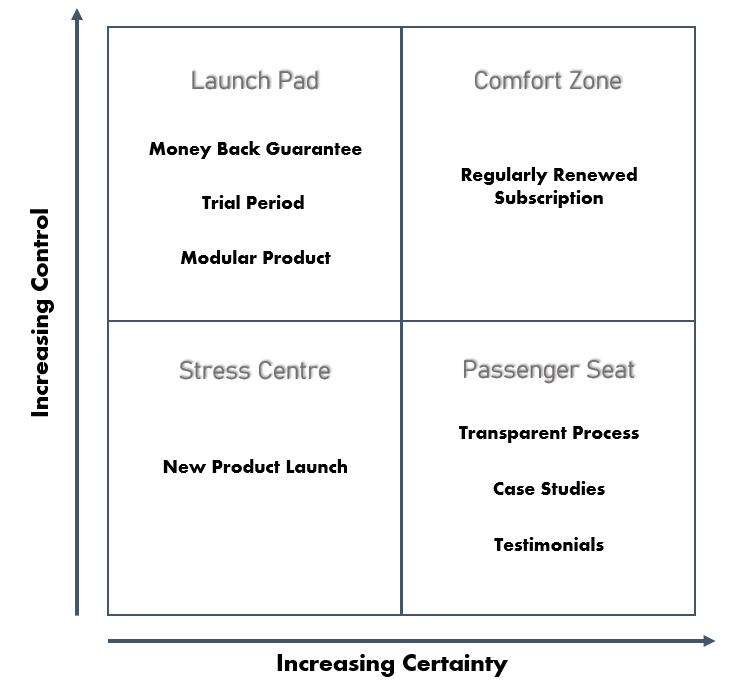
Agency Matters
One of the most important elements of managing, marketing and selling to people is the ability to make them feel in control.
According to McKinsey, companies that focus on people’s performance are four times more likely to outperform and have on average 30% higher revenue growth than peers.
One important way to improve employee and sales performance is to boost confidence in outcomes. This may be done by increasing certainty and control.
What is Agency?
Agency is the feeling of control rather than being in control. Listening to people and allowing them an input into a process is a start.
This principle is factored into products. Pedestrian crossings and elevator doors both have placebo buttons that often do nothing. People feel in control when pressing.

Operational transparency, such as watching a cartoon car arrive on an Uber app, improves customer experience and loyalty.
The Harvard Business Review shows that customers of firms lacking operational transparency pay less for products and are more likely to defect to the competition.
Over time, genuine control becomes more important. Employees whose feedback is never heeded become disheartened. Your Uber must arrive on time on almost every occasion.
Whether you are dealing with employees or customers, making them feel valued is an important part of winning and retaining clients. Showing people they are valuable with data, time off and discounts boosts loyalty.
This is all about increasing confidence that you are a great company.
Control and Certainty
Peter Atwater’s 2x2 matrix for creating confidence is about increasing control and certainty. He uses the example of a flight, where passengers move between their comfort zone, the passenger seat, the launch pad and a stress centre. This depends on their level of certainty and control at any given time.
We can extend the example to launching a product.

Adapted from “The Confidence Map” by Peter Atwater
On launch, our offer is unfamiliar, both in terms of what it does and whether it works. Buyers are stressed.
Guarantees, flexible payments and trial periods increase control. A buyer does not feel pressured into a decision if there is a get-out clause.
Operational transparency, white papers and testimonials build certainty that an outcome will be delivered.
A combination of both raises confidence to the point where buyers are in their comfort zone.
Disagree and commit
What about more difficult situations? Might employees resist a course of action, or executives insist on an alternative to assert their agency?
Here the principle of disagree and commit is essential. Once everyone has had a fair hearing and a decision is made, even the dissenters must commit to delivering an outcome. Agency comes from being heard rather than always getting your way.
When selling, not all client feedback need be adopted. If you hear something ten times then take it seriously. But the person requesting an alternative colour, might just be trying to be helpful.
At Liquidnet, we ran workshops to showcase new features. Active clients provided feedback and suggestions, as well as sharing how they used products with others. Enthusiasm led to plenty of recommendations and a few were adopted.
Cognitive Bias
There are two ways confidence may be boosted in every situation. The first takes advantage of hyperbolic discounting, which is the tendency to over value near-term rewards.
To benefit from this, pay people staggered bonuses rather than lump sums on completion. In sales, offer the first three months for free.
The goal gradient effect means the closer we are to a conclusion the more confident we become. Regular progress reports build confidence in an outcome and are an opportunity to reassure if there are delays.
The Uber cartoon car often takes a detour but knowing where it has gone keeps customers onside.
Practical Application
Think of three ways each to increase control and certainty in your business. This may be in an upcoming product launch, the success of a marketing campaign, or how to overcome a common objection in your sales process.
Bonus marks if you tackle all three and create 18 ways. Sharing the results increases confidence in your abilities as a leader, colleague and trusted supplier.
I’m Simon Maughan and I write The Profit Elevator as a guide for B2B firms seeking faster growth. Reducing risk is part of Managing and Motivating People in my P.R.O.F.I.T. Through Process Planner.
If you found this letter valuable, please share it with a friend.
